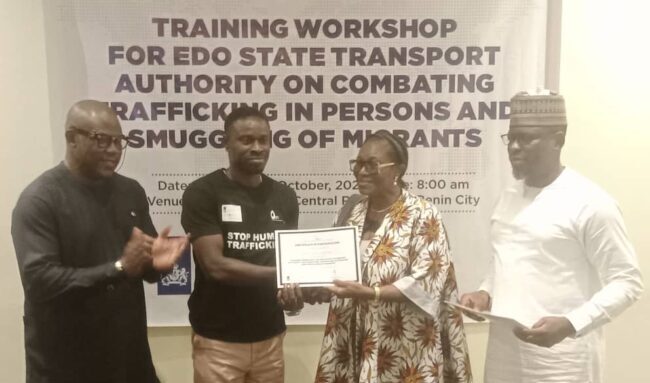The deputy speaker of the Edo State House of Assembly, Maria Edeko, on Thursday, urged members of the Edo State Transport Authority (ESTA) to develop a policy framework in the fight against the menace of trafficking in persons and smuggling of migrants.
Edeko spoke at the end of a two-day training workshop organised by the Centre for Development and Cultural Interchange (CDCI) in Benin City, the state capital.
The deputy speaker assured that the Assembly was ready to give legal backing to such a framework.
She commented on the support of the International Centre for Migration Policy Development and the Ministry of Justice’s efforts in supporting the fight against the danger of human exploitation and deprivation
“The transportation sector plays a major role because it has to do with the movement of people. The training is an eye-opener for the body.
“Edo State Transport Authority should explore the option of developing a policy and take it to the Executive to see, and thereafter, it should be put into law. As an Assembly, we are ready to partner and develop the policy.
Resource Person and the Executive Director, Patriotic Citizen Initiative (PCI), Comrade Osita Osemene, who spoke at the two-day training for stakeholders in fight, said most transport companies are involved in human trafficking unknown to them.
He said transport authorities are stakeholders in the business of human trafficking, irregular migration and smuggling of migrants and that is why the training workshop is vital to those transporters.
Osemene urged attendees at the training workshop to always alert the appropriate authority whenever there is a red flag indicating trafficked persons to enable victims to be rescued.
“Basically, our area of focus is the protection of migrants, in terms of promoting their dignity and ensuring they are integrated back into society.
“This training is very important for transport authorities, those that regulate the transport sector. They are critical stakeholders and first contacts that have direct contact with the transport organisations, and they need a practical understanding of human trafficking.
“One of the key things this programme is coming out with is to equip them with the knowledge that will help them to transfer the knowledge to the beneficiaries, who are the transporters.
In his remarks, the Executive Director of the Centre for Development and Cultural Interchange (CDCI), Emmanuel Sule, explained that the involvement of stakeholders like the Edo State Transport Authority (ESTA) is to get the support and cooperation of operators in the sector.
According to Sule, “Since 2023, we launched the transport union against trafficking in person project, which involves training drivers and transport operators on how to identify and report trafficking in persons to the law enforcement agencies. After some time, we discovered that it was really vital to get government agencies involved.
“As a non-governmental organisation, there is really nothing we could do. Getting the Edo State Transport Authorities involved is a strategy we developed. So that they can mandate or compare transporters to follow the necessary guidance that would help us reduce the movement of Edo people through vehicles to various states.
“We are building the capacity of the ministry’s staff to understand the dangers and what it entails to reduce the problem of human trafficking and irregular migration.
Also, the Director of Transport Planning, Edo State, Engr. George Aghahowa, in his brief remarks, said the training is an eye opener for transporters in understanding the strategy and method of identifying trafficked victims in the line of their duty and reporting such to the appropriate authorities.
The highlight of the training was the presentation of certificates to participants at the event.
ALSO READ THESE TOP STORIES FROM NIGERIAN TRIBUNE
